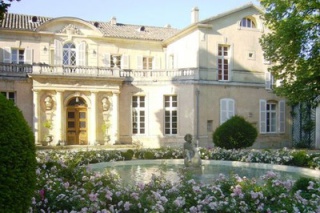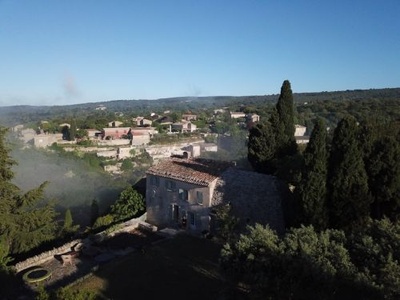Contact us
Provence Luberon
Sotheby's International Realty
Sotheby's International Realty
- Place du Château
- 84220 GORDES, France
- +33 4 90 72 55 00
Provence Luberon
Sotheby's International Realty
Sotheby's International Realty
- 97 place du 8 Mai
- 84380 MAZAN, France
- +33 4 65 09 00 96
Send an email
Buy a castle in French Provence
5 questions to ask before buying a castle in France, especially in Provence

A cultural territory that has preserved many vestiges of its history, the Luberon as France is full of architectural beauties. Among them, the castles constitute a real estate market in its own right. While some are listed or classified as historical monuments, others are "only" manors. The term "castle" is indeed used for various types of buildings.
In total, how many buildings are to be sold in France on this market? If we speak of castles in the proper sense with a drawbridge, moats, etc ... there are few. Real castles certainly sell less than fifty per year, and castles emblematic, less than five a year. Afterwards, there are mansions, mansions, farmhouses. There is a classic market so it sells much more.
1. How much does it cost?
According to certain criteria such as the size of the building, its state of restoration or the area of the land, the price can vary from a few hundred thousand euros to several million. But beyond 5 million, it becomes difficult to find a buyer, although some agencies do not hesitate to post prices of 10 or 20 million euros. Only the monuments of the history of France in very good state of conservation justify these tarifs.
In the calculation of the cost, however, it is not only the selling price to be taken into account. Maintenance costs and expenses represent a not insignificant sum, estimated at about 20,000 to 30,000 euros per year for a medium-sized castle, 70,000 to 80,000 euros for a bigger castle, or even 100,000 to 150,000 euros for a very large castle Which employs personnel.
2. Is this a good investment?
One must never do this to hope to make money, it is above all a passionate purchase, a lover of stones. When one buys a castle and sells it, one will return as best as possible to the expenses incurred. The mission of future châtelains is often to find an activity to finance the running costs of the building. Those who do best will turn them into bed and breakfast or luxury hotels. Profitability is not easy to find, we must look for profitable models. We explain to the purchasers that it is necessary to develop activities that are related to the building, for example visits organized around the castle. There is an audience for that.
3. Do I have the profile to become a customer?
To acquire a castle requires first of all a minimum patrimony, that goes without saying. But money does not do it all. The passion for the old stone must be there too. "You really have to be an amateur to buy a castle," says Alexander Kraft, CEO of Sotheby's International Realty France. "It's not an apartment or a condominium, it's something that requires a bit of passion, there's always something to do, to maintain. You must want to be a squire. I have never had a customer who bought a castle just as an investment. "
4. Is it a good time to buy?
There is no specific good time in a market. It depends on the desire we have, the availabilities we have, the means we have ... However, we note that the market is decreasing, which allows the consumer attracted by the beautiful stones of Benefit from lower prices than in previous years. Without there being any alarming fall. The general background is that people are more cautious about investing in a building like this. But when sellers listen to what we tell them, they sell within 6 months.
5. What are the tax benefits?
The purchase of a castle entitles to different types of financial and tax assistance.
For buildings located in the Saved Sector
The Malraux 2014 law, which since January 1, 2013 no longer falls within the cap of tax niches, gives right to a tax reduction if the owner undertakes restoration work on the property. This reduction, up to 30%, is calculated on the amount of restoration work undertaken by the taxpayer, amount capped at 100,000 euros per year.
For buildings located in an Urban or Landscape Architectural Heritage Protection Zone (ZPPAUP)
The Malraux law also applies, but the tax reduction is 22%.
For monuments registered or classified historical, the owner can benefit from public subsidies. "The administrative authority ... is authorized to subsidize the conservation and maintenance work of a registered or classified historic monument," explains Patrice Besse in a document entitled "10 questions on historical monuments accompanied by their reply" Co-written with the Historical Residence. The owner may also benefit from a patronage system, "subject to the signing of an agreement (...) providing for a commitment of ten years of conservation and opening to the public"
A specific tax regime applies:
"The property charges (...) relating to the protected parties are deductible up to 50% of the taxable income. The deduction rate is increased to 100% when the monument is open to the public or for the part of the subsidized works remaining at the expense of the owner - these expenses are deductible from the land income with deferral of the possible deficit on the total income (... ) Or directly from income when the owner retains the use of the property. "
An exemption from inheritance or gift tax may be introduced even if the buyer is not a member of the family. The condition ? That the heirs, legatees or donees sign an agreement of indefinite duration with the Ministers of Culture and Finance including a commitment of indefinite duration of conservation and opening to the public.
These devices are of course cumulative, since, for example, historical monuments are often located in ZPPAUPs.
In total, how many buildings are to be sold in France on this market? If we speak of castles in the proper sense with a drawbridge, moats, etc ... there are few. Real castles certainly sell less than fifty per year, and castles emblematic, less than five a year. Afterwards, there are mansions, mansions, farmhouses. There is a classic market so it sells much more.
1. How much does it cost?
According to certain criteria such as the size of the building, its state of restoration or the area of the land, the price can vary from a few hundred thousand euros to several million. But beyond 5 million, it becomes difficult to find a buyer, although some agencies do not hesitate to post prices of 10 or 20 million euros. Only the monuments of the history of France in very good state of conservation justify these tarifs.
In the calculation of the cost, however, it is not only the selling price to be taken into account. Maintenance costs and expenses represent a not insignificant sum, estimated at about 20,000 to 30,000 euros per year for a medium-sized castle, 70,000 to 80,000 euros for a bigger castle, or even 100,000 to 150,000 euros for a very large castle Which employs personnel.
2. Is this a good investment?
One must never do this to hope to make money, it is above all a passionate purchase, a lover of stones. When one buys a castle and sells it, one will return as best as possible to the expenses incurred. The mission of future châtelains is often to find an activity to finance the running costs of the building. Those who do best will turn them into bed and breakfast or luxury hotels. Profitability is not easy to find, we must look for profitable models. We explain to the purchasers that it is necessary to develop activities that are related to the building, for example visits organized around the castle. There is an audience for that.
3. Do I have the profile to become a customer?
To acquire a castle requires first of all a minimum patrimony, that goes without saying. But money does not do it all. The passion for the old stone must be there too. "You really have to be an amateur to buy a castle," says Alexander Kraft, CEO of Sotheby's International Realty France. "It's not an apartment or a condominium, it's something that requires a bit of passion, there's always something to do, to maintain. You must want to be a squire. I have never had a customer who bought a castle just as an investment. "
4. Is it a good time to buy?
There is no specific good time in a market. It depends on the desire we have, the availabilities we have, the means we have ... However, we note that the market is decreasing, which allows the consumer attracted by the beautiful stones of Benefit from lower prices than in previous years. Without there being any alarming fall. The general background is that people are more cautious about investing in a building like this. But when sellers listen to what we tell them, they sell within 6 months.
5. What are the tax benefits?
The purchase of a castle entitles to different types of financial and tax assistance.
For buildings located in the Saved Sector
The Malraux 2014 law, which since January 1, 2013 no longer falls within the cap of tax niches, gives right to a tax reduction if the owner undertakes restoration work on the property. This reduction, up to 30%, is calculated on the amount of restoration work undertaken by the taxpayer, amount capped at 100,000 euros per year.
For buildings located in an Urban or Landscape Architectural Heritage Protection Zone (ZPPAUP)
The Malraux law also applies, but the tax reduction is 22%.
For monuments registered or classified historical, the owner can benefit from public subsidies. "The administrative authority ... is authorized to subsidize the conservation and maintenance work of a registered or classified historic monument," explains Patrice Besse in a document entitled "10 questions on historical monuments accompanied by their reply" Co-written with the Historical Residence. The owner may also benefit from a patronage system, "subject to the signing of an agreement (...) providing for a commitment of ten years of conservation and opening to the public"
A specific tax regime applies:
"The property charges (...) relating to the protected parties are deductible up to 50% of the taxable income. The deduction rate is increased to 100% when the monument is open to the public or for the part of the subsidized works remaining at the expense of the owner - these expenses are deductible from the land income with deferral of the possible deficit on the total income (... ) Or directly from income when the owner retains the use of the property. "
An exemption from inheritance or gift tax may be introduced even if the buyer is not a member of the family. The condition ? That the heirs, legatees or donees sign an agreement of indefinite duration with the Ministers of Culture and Finance including a commitment of indefinite duration of conservation and opening to the public.
These devices are of course cumulative, since, for example, historical monuments are often located in ZPPAUPs.
The latest news





